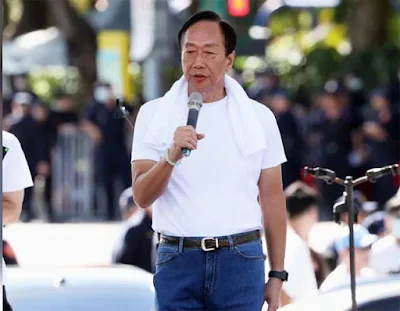鴻海創辦人郭台銘投書,郭台銘批判日前民進黨總統參選人賴清德在「華爾街日報」的投書內容
https://www.washingtonpost.com/opinions/2023/07/17/taiwan-china-agreements-safety
郭台銘(Terry Gou)指賴清德要放棄「一中各表」框架來和中國大陸談判,只是加劇戰爭威脅;唯有通過在「一中各表」框架下直接與中國合作,兩岸才能真正走向和平。
↓ 翻譯中文全文 ↓
台灣不能放棄與中國多年的協議;富士康創辦人郭台銘是台灣國民黨的重要人物。
隨著俄羅斯入侵烏克蘭,顯示大國之間的大規模戰爭已成為21世紀的現實,台灣海峽重新成為世界上最危險的前線之一。國務卿布林肯和財政部長葉倫最近對北京的訪問為美中關係開辟了比過去幾年更有希望的道路,但只要台灣的未來仍然充滿不確定性,這些關係就無法穩定,也無法保證台灣人民應得的和平。
北京、華盛頓和台北共同對目前的對峙狀態負有責任。但台灣面臨最大的風險,台灣的人民和領導人需要採取必要的措施來確保其未來。
現任的民進黨領導層只是讓情勢變得更緊張。根據所謂的1992共識,台灣和中國同意接受一個中國的框架,儘管雙方對該術語有不同的解釋,並就此進行討論,多年來達成了一些有成效的協議。但在蔡英文2016年成為台灣總統後不久,中國引用她拒絕接受北京的解釋(其中包括台灣作為中國的一部分)作為終止兩岸談判的理由,並且至今未恢復。
競選接替蔡英文擔任總統的副總統賴清德呼籲減少與大陸的貿易關係,他稱之為「依賴」,並堅持這些可以由一個國際合作夥伴網絡來取而代之。與蔡英文一樣,他拒絕接受一個中國的框架。
但是,執政黨希望放棄的1992共識促進了數百萬人次的兩岸訪問、大規模投資和雙向貿易、經濟增長、每周數百班的直航航班、緩和緊張局勢以及對兩岸和平未來的樂觀態度。通過放棄與中國進行談判的一個中國框架,現任台灣領導人及其希望取而代之的黨內人士大大加劇了戰爭威脅,使台灣在國際上孤立,損害了我們的經濟,嚇跑了投資者,使台灣變得更不安全。
我長期主張立即恢復台灣與中國之間的直接兩岸談判,作為真正緩和緊張局勢並維護台灣民主、自由和法治的唯一途徑。為了黨派政治優勢或借助美中對抗而擺姿態,不能替代與那些對我們未來影響最大的人進行真正的談話和談判的真實工作。借用已故以色列領導人拉賓的話,與你的敵人談判和平,而不是與你的朋友。我在與中國(包括其領導人和人民)的廣泛商務往來和個人經驗告訴我,他們之間不需要成為敵人,正如他們在現任領導層的眼中所看到的那樣。
台灣人民需要和平與穩定,確保一個沒有不確定性的美好未來。對我來說,和平並非抽象概念。我是那一代人的一員,他們曾為保衛台灣而戰:50年前,我在金門島服役,該島在1958年遭受中國的轟炸,敵對狀態持續了二十年。我們台灣人民必須確保這樣的事件永不重演。不幸的是,輕率的言辭和挑釁性政策正在增加事件再次發生的可能性,而非減少。
台灣已成為科技和經濟發展的世界領導者。在很大程度上,這是通過與中國合作夥伴共同利用其人民和企業的創業才能實現的。在與中國直接對話中,台灣可以向世界展示,通過在重要問題的务实談判中捍衛其完整性和價值觀,以及緩解緊張局勢,它也可以成為一個負責任的全球政治行為者。
台灣人民非常感謝美國在過去七十年間提供的物質和道義支持。台灣的民主、經濟活力和強大防禦力很大程度上歸功於美國人民。這種支持仍然非常重要。但是,當一個民族需要為自己承擔主要責任時,就需要放棄對一種變成不健康依賴的教導。台灣必須掌握自己的命運,加強威懾能力,同時提供一種符合地區和全球利益的和平方法,但最重要的是符合自己的利益。
唯有在「一個中國」的框架下,台灣才能通過與中國直接合作實現這一點。
這將需要兩國高級領導人直接面對面的對話。在這樣的框架下,台灣有足夠的空間來全面保護其民主、自由和生活方式,同時我們進行討論和談判的過程必定漫長而艱難。但與此同時,中國和台灣必須就一個能使我們遠離危險邊緣的框架和過程達成共識,這是絕對至關重要的。

https://udn.com/news/story/123307/7306624
Opinion
Taiwan must not walk away from years of agreements with China
Terry Gou, the founder of Foxconn, is a leading figure in the Kuomintang (KMT) political party in Taiwan.
With Russia’s invasion of Ukraine showing that large-scale war involving great powers is a 21st-century reality, the Taiwan Strait has reemerged as one of the most dangerous front lines in the world. Recent visits to Beijing by Secretary of State Antony Blinken and Treasury Secretary Janet L. Yellen opened a more promising pathway for U.S.-China relations than has existed in the past few years, but as long as the future of Taiwan remains fraught, there cannot be stability in those relations nor assurance of the peace that the people of Taiwan deserve.
Beijing, Washington and Taipei share responsibility for the current state of confrontation. But Taiwan is most at risk — and it is up to Taiwan, its people and its leaders to take the necessary steps to secure its future.
The current Democratic Progressive Party leadership has only made the situation more tense. Under the so-called 1992 Consensus, Taiwan and China agreed to accept the framework of One China — although the parties have differing interpretations of that term — and held discussions that over the years resulted in a number of productive agreements. But shortly after Tsai Ing-wen became Taiwan’s president in 2016, China cited her refusal to accept Beijing’s interpretation — which includes Taiwan as part of China — as a justification to end the cross-strait talks, and they have not resumed.
Vice President Lai Ching-te, who is running to succeed Tsai as president, has called for reducing trade ties with the mainland, which he calls “dependencies,” and insists that they can be replaced by an international network of partners. Like Tsai, he rejects the One China framework.
But the 1992 Consensus the ruling party wishes to walk away from has facilitated millions of visits across the strait, massive investments and two-way trade, economic growth, hundreds of weekly direct flights, a relaxation in tensions and a sense of optimism about a peaceful future on both sides. By abandoning the One China framework for talks, the current leaders in Taiwan and those in their party who would replace them have greatly aggravated the threat of war, isolated Taiwan internationally, damaged our economy, scared away investors and made Taiwan less secure.
I have long advocated the immediate resumption of direct cross-strait negotiations between Taiwan and China as the only way to truly ease tensions and to preserve Taiwan’s democracy, freedom and rule of law. Posturing for partisan political advantage or to piggyback on U.S.-China confrontation is no substitute for the real work of talking and negotiating with those who will have the most impact on our future. To loosely quote the late Israeli leader Yitzhak Rabin, you negotiate peace with your enemies, not with your friends. We need to ensure that in the future Taiwan and China will not behave as enemies, as they see each other under the present leadership. My extensive business dealings and personal experience with China — both its leadership and its people — tell me that they need not be.
The people of Taiwan need peace and stability to ensure a bright future, unclouded by uncertainty. Peace is not an abstraction for me. I am part of the generation that fought to defend Taiwan: I served 50 years ago on Kinmen, which was bombarded by China in 1958, with hostilities persisting for two decades. We, the people of Taiwan, must ensure that such events are never repeated. Unfortunately, reckless rhetoric and provocative policies are making a recurrence more likely, not less.
郭台銘投書華郵:賴清德應接受「一中各表」與中國談判 緩解兩岸緊張
https://tw.nextapple.com/finance/20230717/B99354BAB37DD505F9A7FC225705B3A7
郭:[根據所謂的1992共識,台灣和中國同意接受一個中國的框架,儘管雙方對該術語有不同的解釋 ]
根本是錯誤認知,誤導國際視聽, PRC 裏的中國,根本沒有ROC的地位。 世界都知,CHINA 就是 中華人民共和國PRC , 在美國的法律,官方認知[台灣關係法]裡,這個島 沒有中國民國, 單純的是『台灣』,根本沒有中國的成分。
陸委會針對郭台銘的意見,解釋說明:
https://www.mac.gov.tw/News_Content.aspx?n=B383123AEADAEE52&sms=2B7F1AE4AC63A181&s=ED3F2EE361152678
大陸委員會就郭台銘先生昨(17)日於華盛頓郵報投書,主張臺灣應通過「一中各表」的框架,直接與中國大陸進行合作與談判乙節,說明如下。
(一)、略懂兩岸關係的人都清楚知道,兩岸之間從未有郭先生所謂「一中各表的框架」,只有由中共片面設定,意圖消滅中華民國、併吞臺灣的「一個中國原則框架」。從郭先生媒體投書的內容可以確認,郭先生不是完全不瞭解中共對臺的政治圖謀,就是故意美化中共消滅中華民國、併吞臺灣的企圖。
(二)、依照中共所公布的「一個中國原則」白皮書,中華民國政府只是中國大陸領土上的一個「地方當局」,中共亦多次重申「九二共識」是「體現一個中國原則的九二共識」,將「九二共識」做為兩岸對話的前提,實際上就是強迫臺灣以「地方政府」的地位與其互動,這是違背中華民國臺灣做為一個主權國家的事實,臺灣民眾絕不會接受,相信也沒有任何一位中華民國的領導人會有這樣的政治主張。
(三)、中華民國是主權國家,臺灣從來不是中華人民共和國的一部分,「兩岸互不隸屬」是臺海現狀與客觀事實。1996年後,臺灣的政經環境歷經3次政黨輪替,期間臺灣民眾已經7度用選票選出國家的元首,我們認為中共當局必須正視中華民國臺灣已經存在的事實,不應該設置政治對話的前提,讓兩岸之間一再喪失良性互動的契機。
(四)、政府兩岸政策立場一貫,依據中華民國憲法、兩岸人民關係條例處理兩岸事務,致力維護臺海和平穩定;蔡總統上任以來,堅定「四個堅持」、強化「四大韌性」,捍衛國家主權及民主自由。我們在臺海不挑釁、不躁進的作為,受到國際的肯定,各國也認為是中共對臺脅迫施壓,因而要求中共不能在臺海動武,國際更不斷給予臺灣支持。我們呼籲中共放棄僵化的意識形態與政治前提,以開放的態度進行兩岸對話。
新聞聯絡人:李小姐
電話:23975589分機7010
陸委會認為,略懂兩岸關係的人都清楚知道,兩岸之間從未有郭先生所謂「一中各表的框架」,只有由中共片面設定,意圖消滅中華民國、併吞台灣的「一個中國原則框架」。
來源: https://udn.com/news/story/7331/7307883
陸委會認為,郭台銘此舉不是完全不瞭解中共對台的政治圖謀,就是故意美化中共消滅中華民國、併吞台灣的企圖

